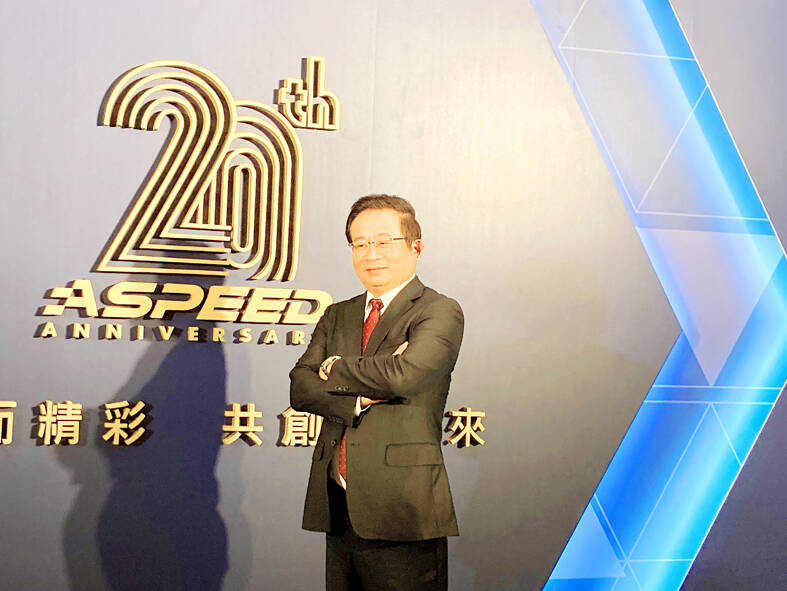Aspeed Technology Inc (信驊), the world’s biggest supplier of baseboard management controllers (BMC) used in servers, yesterday gave a bullish revenue outlook for next year mainly driven by constantly strong demand for artificial intelligence (AI), following explosive growth this year.
During the first 10 months of this year, Aspeed has witnessed annual growth of 104 percent in revenue to NT$5.04 billion (US$155 million), significantly outpacing its earlier estimate of between 40 percent to 50 percent growth, thanks to exuberant demand for general servers and AI servers, Aspeed chairman and president Chris Lin (林鴻明) said.
“Demand is surprisingly good this year,” Lin said. “For next year, we have got a feeling that it will be a better year, given that a lot of customers are hiking their capital expenditures on AI servers. We are optimistic about overall revenue prospects next year, despite muted demand for general AI servers.”

Photo: Lisa Wang, Taipei Times
The AI boom could elevate AI server revenue to between 20 percent and 25 percent of the company’s overall revenue next year, compared with about 15 percent this year, Lin said.
Aspeed commands 70 percent of the world’s BMC market.
On its product development progress, Lin said the company is working with customers to develop next-generation BMCs and expects the new controller, code-named AST2700, to ramp up production in 2026. Aspeed aims to hold steady its gross margin at 65 percent through adjusting new product prices, he said.
The company saw its quarterly net profits soar 43.5 percent sequentially, or up 170 percent annually, to NT$729 million last quarter, setting an all-time high. That brought the first three quarters’ net profit to NT$1.63 billion, more than four times the firm’s share capital of NT$378 million.
Gross margin improved to 64.3 percent last quarter from 63 percent a year earlier.
Each AI server rack based on GB200/NVL72 chips from Nvidia Corp would consume 87 BMCs, a surge from 12 BMCs used in the AI server rack powered by H100 chips, Aspeed said.
As Aspeed turns 20 years old this year, Lin said the company was inspired by Quanta Computer Inc (廣達) producing the world’s first BMC in 2004. Since then, Aspeed’s small single-chip BMC has gradually replaced its chunky and expensive predecessors at affordable prices, Lin said.
Quanta assembles notebook computers for Apple Inc and makes servers for Nvidia, and is one of the biggest customers of Aspeed today.
Nvidia considers Aspeed’s BMC an essential part of its AI servers, and yet an “inexpensive” chip, Lin said.

MULTIFACETED: A task force has analyzed possible scenarios and created responses to assist domestic industries in dealing with US tariffs, the economics minister said The Executive Yuan is tomorrow to announce countermeasures to US President Donald Trump’s planned reciprocal tariffs, although the details of the plan would not be made public until Monday next week, Minister of Economic Affairs J.W. Kuo (郭智輝) said yesterday. The Cabinet established an economic and trade task force in November last year to deal with US trade and tariff related issues, Kuo told reporters outside the legislature in Taipei. The task force has been analyzing and evaluating all kinds of scenarios to identify suitable responses and determine how best to assist domestic industries in managing the effects of Trump’s tariffs, he

TIGHT-LIPPED: UMC said it had no merger plans at the moment, after Nikkei Asia reported that the firm and GlobalFoundries were considering restarting merger talks United Microelectronics Corp (UMC, 聯電), the world’s No. 4 contract chipmaker, yesterday launched a new US$5 billion 12-inch chip factory in Singapore as part of its latest effort to diversify its manufacturing footprint amid growing geopolitical risks. The new factory, adjacent to UMC’s existing Singapore fab in the Pasir Res Wafer Fab Park, is scheduled to enter volume production next year, utilizing mature 22-nanometer and 28-nanometer process technologies, UMC said in a statement. The company plans to invest US$5 billion during the first phase of the new fab, which would have an installed capacity of 30,000 12-inch wafers per month, it said. The

Taiwan’s official purchasing managers’ index (PMI) last month rose 0.2 percentage points to 54.2, in a second consecutive month of expansion, thanks to front-loading demand intended to avoid potential US tariff hikes, the Chung-Hua Institution for Economic Research (CIER, 中華經濟研究院) said yesterday. While short-term demand appeared robust, uncertainties rose due to US President Donald Trump’s unpredictable trade policy, CIER president Lien Hsien-ming (連賢明) told a news conference in Taipei. Taiwan’s economy this year would be characterized by high-level fluctuations and the volatility would be wilder than most expect, Lien said Demand for electronics, particularly semiconductors, continues to benefit from US technology giants’ effort

‘SWASTICAR’: Tesla CEO Elon Musk’s close association with Donald Trump has prompted opponents to brand him a ‘Nazi’ and resulted in a dramatic drop in sales Demonstrators descended on Tesla Inc dealerships across the US, and in Europe and Canada on Saturday to protest company chief Elon Musk, who has amassed extraordinary power as a top adviser to US President Donald Trump. Waving signs with messages such as “Musk is stealing our money” and “Reclaim our country,” the protests largely took place peacefully following fiery episodes of vandalism on Tesla vehicles, dealerships and other facilities in recent weeks that US officials have denounced as terrorism. Hundreds rallied on Saturday outside the Tesla dealership in Manhattan. Some blasted Musk, the world’s richest man, while others demanded the shuttering of his